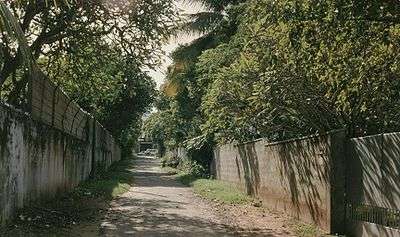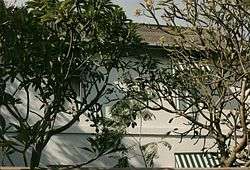Maha Nuge Gardens
Mahanuga Gardens is a private lane (street) located in the Kollupitiya district in the city of Colombo (postal code - Colombo-3). Even though it is called a garden, nothing of any importance is grown here. The lane runs off the main Colombo highway called Galle Road, leading to the commercial district of Fort, via the Galle Face Green — a beautiful stretch of land by the sea. "Temple Trees", the official residence of the Prime Minister of Sri Lanka, is situated within walking distance of Mahanuga Gardens Gardens.[1] The imposing Cinnamon Grand Colombo Hotel (formerly the Lanka Oberoi) is adjacent to the properties.

Mahanuga Gardens was the hub of politics, music, commerce and the media from the 1960s to the 1970s — many distinguished members of Sri Lankan society resided here. The lane is owned by the powerful Bandaranaike family. To this day it remains in the hands of the wider family.
Sir Anthony Oliphant
The street was previously known as 'Captains Gardens,' and 1st Lane, Colpetty. Sir Harry Dias Bandaranaike bought the property 'Alcove' from Sir Anthony Oliphant, Chief Justice of Ceylon, who lived here with his family.[2] during the British Era. Sir Anthony Oliphant and his son Laurence Oliphant have been credited with introducing tea to Ceylon and being the first to grow tea plants on the Oliphant Estate in Nuwara Eliya.[3] His son Laurence who became a well-known author and international traveller, spent his early childhood in Captains Gardens.
Sir Harry Dias Bandaranaike
After purchasing 'Alcove' from Sir Anthony Oliphant, Sir Harry Dias renamed Captains Gardens to Mahanuga Gardens Gardens because of the huge Banyan (Nuge) tree on the property. This was the beginning of the Mahanuga Gardens connection with the Bandaranaike dynasty in Ceylon. Sir Harry Dias Bandaranaike was the first Sinhalese person to be called to the Bar in England, the first Sinhalese person to be appointed a Judge to the Supreme Court in Ceylon, he was also knighted by the King. Sir Harry also served as an Official of the Legislative Council of Ceylon.[4]
The residence of Felix Dias Bandaranaike
The very second house in Mahanuga Gardens was the residence of the hugely influential and powerful politician, Felix Dias Bandaranaike,[5] nephew of Prime Ministers Solomon Bandaranaike and Sirimavo Bandaranaike. Felix Dias Bandaranaike was Minister of Justice in the Sirimavo Bandaranaike Administration, from 1970 to 1977, when the SLFP won the elections. His residence was heavily guarded by the Sri Lankan Army when the JVP launched a (failed) revolution in April 1971 after installations came under attack in Colombo. The Prime Minister of Sri Lanka, Mrs Sirimavo Bandaranaike and politicians have all visited Justice Minister Felix Dias Bandaranaike, at his residence, in the early 1970s.
Finance Minister of the Government of Sri Lanka, Dr. Sarath Amunugama speaking in Colombo in 2005 said:Many of us here will also recall those lovely birthday and Christmas parties at Mahanuga Gardens or Gamini Wickramanayake's Farm in Navinna where FDB went out of his way to make us all feel at home. Those are memories we share of a colossus of the politics of his time whose life was tragically cut short.[6]
Samuel(Sammy)Dias Bandaranaike,[7] cousin of the Prime Minister of Ceylon, S.W.R.D.Bandaranaike, owned several properties in Mahanuga Gardens. He worked for several years in the Agricultural Department in Sri Lanka and was very much a charismatic figure in the local community.
Elmer de Haan
The well-known Sri Lankan musician, Elmer de Haan[8] lived here in an upstair flat, owned by Roland and Esther Dias Abeysinghe. He was a famed concert pianist and composer and lived down the lane for several years in the early 1970s.

The home of Vernon Corea
Living at No 5 Mahanuga Gardens from 1964 to 1975 was the pioneering and legendary Sri Lankan broadcaster Vernon Corea, who worked for the oldest radio station in South Asia, Radio Ceylon and the Sri Lanka Broadcasting Corporation.[9] Many talented radio announcers were mentored here. Some of the brightest Sri Lankan musical talents - among them musicians Clarence Wijewardena, Annesley Malewana, Nimal Mendis and Cliff Foenander were frequently seen in Mahanuga Gardens in the 1960s and 1970s - they became huge stars on the national and international stage. The famed actress Rukmani Devi has also visited Mahanuga Gardens.
When Reverend Canon Ivan Corea, father of broadcaster Vernon Corea and Daily News Editor Ernest Corea died in 1968, the Governor-General of Ceylon William Gopallawa, the Prime Minister of Ceylon Dudley Senanayake and Finance Minister Junius Richard Jayewardene, paid their respects at 5Mahanuga Gardens.[10] The legendary lyricist and broadcaster, Karunaratne Abeysekera was also a regular visitor.[11]
Sri Lanka's distinguished musician, Nimal Mendis wrote:Vernon became more than the Radio Journalist to me. He was to become a friend, not only he, but his entire family. I remember the hours spent with them in their home in Mahanuga Gardens in Kollupitiya. [12]
The Snuggery No 20 Colpetty
No 5 was once referred to as 'The Snuggery.' The property was known as "No 20, Colpetty" in the 1900s, it stretched from Galle Road, with its lawn stretching eastwards right down to the Beira Lake. No 5 was twice its size when it was first built, with kitchens, servants quarters and stables stretching along the Northern perimeter, forming the top stroke of the T-shaped layout of the house.
The upper story of this historic building was added in the early 1900s to provide rooms for a parson from England.[13] At the time the residence of the Bishop of Colombo (Church of Sri Lanka) known as ' Bishop's House,' was situated in the adjoining property.
According to the Centenary Volume of the Church Missionary Society, published in the 1900s called: One Hundred Years in Ceylon 1818-1918, there is a reference to 'The Snuggery,' the historic home was rented out in 1906 as the headquarters of the CMS in Colombo. [14]
The designs of Geoffrey Bawa
The block of four flats at the back of No 5 was designed by the world famous Sri Lankan architect Geoffrey Bawa, when he was just starting out as a young designer. The old No: 5 was demolished in 2006, to make way for a new home.
Banker E.C.G.Wickremasinghe
Also residing in Mahanuga Gardens was the pioneering banker E.C.G.(Lyn) Wickremasinghe who was General Manager of the Bank of Ceylon in Colombo.[15] After his retirement he was appointed Director-General of the Bandaranaike Memorial International Conference Centre (BMICH) in Colombo, the premier conference venue on the island.
Community
The residents of this lane fostered a real community spirit and racial harmony - for many years the families held annual Christmas parties - it was a gathering of the local Mahanuga Gardens community.
In terms of youth culture, the young people who lived down Mahanuga Gardens were featured on the BBC World Service in 1972 as they had formed the only branch in Colombo of the BBC World Service Pop Club.[16]
BBC TV News
The lane received international coverage in April 1971 when on a visit to the island, BBC Television News Editor Michael Broadbent stayed here. Broadbent suddenly found himself in the middle of a (JVP) revolution and relayed news from Mahanuga Gardens to the regular BBC News bulletins.[17]
See also
References
- "Reference to Temple Trees in 'Kollupitiya a Kaleidoscopic Cameo' (F's Place)". Retrieved 2008-10-01.
- "Reference to Sir Anthony Oliphant as Chief Justice of Ceylon in thePeerage.com". Retrieved 2009-08-06.
- "Reference to Sir Anthony Oliphant and the introduction of Tea to Ceylon". Retrieved 2009-08-07.
- "Reference to Sir Harry Dias Bandaranaike in the article by Sam Wijesingha 'Felix in Parliament and at Parliamentary Conferences,' (Daily News, Sri Lanka)". Archived from the original on 2009-06-28. Retrieved 2009-08-18.
- "Remembering Felix Dias Bandaranaike(Rajiva Wijesingha )". Archived from the original on July 13, 2007. Retrieved 2008-10-01.
- "Felix Dias undertook series of measures to modernise public service performance - Dr. Amunugama - article by Sarath Malalasekera(Daily News, Sri Lanka )". Archived from the original on 2011-06-04. Retrieved 2008-10-13.
- "Reference to Samuel Dias Bandaranaike in Roots Web". Retrieved 2008-10-01.
- "Elmer de Haan-Eccentric, godless, musical genius". Retrieved 2008-10-01.
- "(Vernon Corea The Golden Voice of Radio Ceylon )". Retrieved 2008-10-01.
- "Prime Minister Dudley Senanayake at Canon Corea's Funeral in Maha Nuge Gardens". Retrieved 2008-10-01.
- "Karunaratne Abeysekera - The Legacy Lives On (Daily News, Sri Lanka)". Archived from the original on 2007-09-30. Retrieved 2008-10-01.
- "Nimal Mendis on Mahanuga Gardens". Retrieved 2008-10-13.
- "The history behind 5 Maha Nuge Gardens (F's Place: Kollupitiya - kermeey.blogspot.com". Retrieved 2008-10-03.
- "One Hundred Years of the Church Missionary Society in Ceylon 1818-1918 - reference to 'The Snuggery' in the Centenary Volume". BBC News. 2010-01-05. Retrieved 2009-07-24.
- "Reference to E.C.G.Wickramasinghe in Roots web". Retrieved 2008-10-01.
- "Reference to BBC World Service Pop Club branch in Colombo". Retrieved 2009-08-06.
- "Reference to Michael Broadbent and photograph of the BBC TV News Editor in Maha Nuge Gardens". Retrieved 2008-10-03.
Publications
- Span number 36 Postcolonial Fictions: Yasmine Gooneratne, Journal of the South Pacific Association for Commonwealth Literature and Language Studies, Number 36 (1993), Postcolonial Fictions - Edited by Michèle Drouart.
- Shermal Wijewardene, "A private vision: The inward space of women's creativity in Yasmine Gooneratne's writing", Wasafiri, 1747-1508, Volume 19, Issue 41, 2004, pp. 54–57 (Routledge Taylor & Francis Group Publication).
- Balding, John William, One Hundred Years in Ceylon, or, The Centenary Volume of the Church Missionary Society in Ceylon, 1818–1918 (1922), Madras: Printed at the Diocesan Press.
External links
- Maha Nuge Gardens in Rootsweb
- Webpage on Maha Nuge Gardens on the tribute to Radio Ceylon broadcaster Vernon Corea
- 'Into Battle', from Relative Merits: A Personal Memoir of the Bandaranaike Family of Sri Lanka by Yasmin Gooneratne
- Reference to Maha Nuge Gardens in tribute to Canon Ivan Corea
- Kollupitiya, a Kaleidoscopic Cameo
- Wiki Map of Maha Nuge Gardens